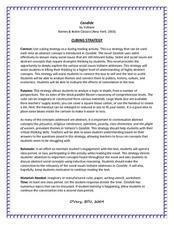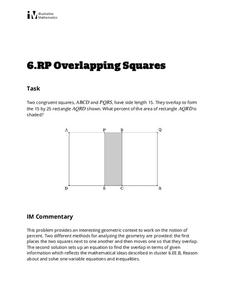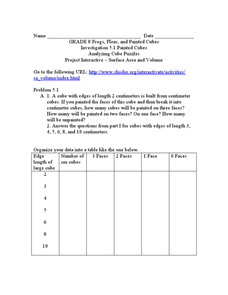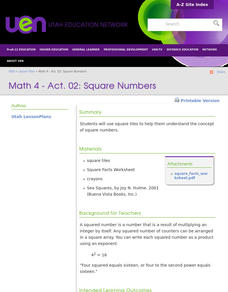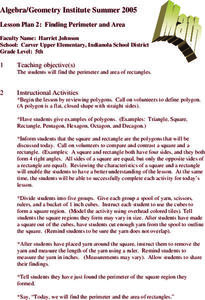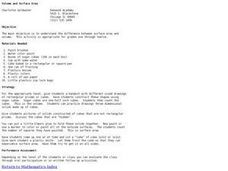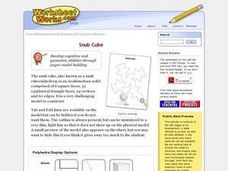Curated OER
Candide Cubing Strategy
Candide is a dense text. To assist in analyzing Voltaire's satire, groups employ a cubing strategy based on Bloom's taxonomy. Complete directions for the strategy, a template for the cube, a worksheet, and a topic list are included.
Illustrative Mathematics
Overlapping Squares
The objective of this activity is to find the percent of the area of a two squares overlapping. Mathematicians find the ratio of area for the part that overlaps to the rectangle formed. The final answer is a percent as a rate per 100....
Curated OER
Easy Worksheet: Simplifying Radicals
In this simplifying radicals worksheet, students solve 18 short answer problems. Students simplify radicals of non-perfect square numbers. Students find the square and cube roots of positive rational numbers.
Curated OER
Addition Squares
In this addition worksheet, 1st graders add together all the numbers going across and down 8 cubes. Students add any missing numbers in order for each addition math problem to be the same sum going across and down.
Curated OER
Quadratics and Difference of Squares
For this algebra worksheet, students factor quadratic equations using the difference of squares and cubes. They factor other polynomials finding the roots. There are 37 questions with an answer key.
Charleston School District
Evaluation of Roots
You mean the square root of five and five don't have the same value? Learners estimate the value of irrational roots. As they practice estimating the value, they increase their understanding of roots. The lesson is the fourth in a series...
Curated OER
Tangerine: Cubing Strategy
Here's an activity that uses a reading comprehension strategy based on Bloom's taxonomy to focus readers' attention on key passages from Edward Bloor's Tangerine. Worthy of a place in your curriculum library.
Curated OER
Surface area of a cube
In this surface area of a cube worksheet, students answer short answer questions on how to find the surface area and calculating the equation for different problems. Students answer 7 questions.
Curated OER
Analyzing Cubes
In this analyzing cubes worksheet, 9th graders solve and complete 6 different types of problems. First, they organize the given data into the table provided. Then, students study the patterns in the table and tell whether the pattern of...
Curated OER
Square Numbers
Fourth graders use square tiles to help them explain the concept of square numbers.
Curated OER
Geometry: Shapes-Squares, Rectangles and Triangles
In this geometry worksheet, students distinguish which of eight shapes are squares, rectangles and/or triangles. Students write the name of each shape on the lines provided.
Curated OER
Number Patterns: Square and Rectangular Numbers
Students explore number patterns. In this number pattern lesson, students discover the attributes of square and rectangular numbers as well as the number patterns associated with them. Students complete worksheet activities...
Centre for Education in Mathematics and Computing
Roots and the Pythagorean Theorem
In this roots and the Pythagorean Theorem worksheet, learners solve 15 different types of problems related to square roots and applying the Pythagorean Theorem. They first determine the square root of each number and then, the cube root....
Curated OER
Finding Perimeter and Area
Geometers find the perimeter and area of rectangles. They discuss the definitions and characteristics of rectangles and squares. In groups, they use yarn to discover the perimeter of squares and rectangles. They count cubes to explore...
Curated OER
Learning by Logic - Total Surface Area
Geometers calculate the area of plane surfaces using the formulas for the area of a square, rectangle, and triangle. They develop the formula for calculating the total surface area of two geometric solids: the cube and rectangular prism.
Curated OER
Volume and Surface Area, A Sweet Activity
Geometry.... sweet! Using sugar cubes, learners build rectangular prisms of different sizes and shapes. They glue them together and assess volume. Then they color the outer sides to visualize and compute surface area. To make a visceral...
Curated OER
Recognize and Draw Shapes
What type of shape is this? Learners practice identifying shape attributes as they name a parallelogram and an oval and count the sides of a cube and a triangle. There are multiple-choice answers for the shape-name questions, so...
EngageNY
Comparing Quadratic, Square Root, and Cube Root Functions Represented in Different Ways
Need a real scenario to compare functions? This lesson plan has it all! Through application, individuals model using different types of functions. They analyze each in terms of the context using the key features of the graphs.
Curated OER
Paper Folding to Make Cubes
Examine patterns of figures composed of six-squares and predict which of the twenty presented could be folded to make a cube. They then fold large-scale patterns of these figures to confirm their hunches.
Curated OER
Mathematics Teacher September 2002
In this algebra lesson, students analyze and play with a trimagic square. They play a game through addition and squaring and cubing.
Curated OER
Recognize and Draw Shapes
Each of these 10 shapes comes with a question for learners to answer as they analyze its attributes. They examine the following shapes: hexagon, trapezoid, pentagon, circle, diamond, parallelogram, rectangle, triangle,...
Novelinks
The Book Thief: Cubing Strategy
Whether used to review prior to a reading assessment or as a way to generate ideas for an essay, this activity is sure to encourage critical thinking about Markus Zusak's The Book Thief. Kids create a six-sided question cube with each...
Curated OER
Snub Cube
In this math activity, students create a paper model of a snub cube. It is an Archimedean solid comprised of 6 square faces, 32 equilateral triangle faces, 24 vertices and 60 edges.
Curated OER
The Five Number Game
Learners explain what it means to square numbers. They explain what it means to cube numbers. Students define prime numbers using their own language. They are introduced to the problem by playing one game as a class.


